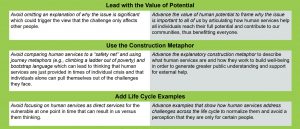Tips to Avoid Cuing Individualism
May 28, 2020We know that we need sustained public and private action to address the COVID-19 crisis and rebuild in its aftermath. Unfortunately, individualism is a common communications trap that implicitly gives government and other institutions permission not to respond to the economic effects of the Coronavirus. When the public defaults to individualism, they associate a person’s well-being, or lack thereof, with their choices and behaviors, leaving government no role to play in building well-being. Individualism is one of the cultural models — or “deeply held understandings that motivate thought and behavior in largely unconscious and automatic ways” — that results in the public’s unproductive interpretations of human needs and services. This trap can activate several misconceptions, including:
- A person’s condition is attributed to their actions and choices, assigning them responsibility for fixing it, rather than understanding how the broader societal systems and structures contribute to their situation and should help improve it;
- People therefore need human services because of their own choices, behaviors and failings;
- Direct service recipients are the sector’s sole beneficiaries, instead of illuminating the broader societal benefits of the sector’s work;
- Human services are just direct, one-time, temporary charitable interventions to address the basic needs of people in crisis, leaving out large segments of the sector’s work, such as prevention, research and advocacy;
- There are deserving (e.g., employed) and undeserving (e.g., unemployed) recipients of human services; and
- Those who benefit from human services are “the other,” stoking a “them” versus “us” zero-sum outlook.
Readers may recall that we recently introduced tools to combat individualism and fatalism in our communications. We’ve developed tips, including the below based on the Building Well-Being Narrative, to help prevent communications from activating individualism that can lead audiences to devalue human service programs and policies and excuse government inaction:

For a compilation of all the reframing guidance, see Tips to Avoid Individualism in Human Service Communications.
SPOTLIGHT: New York Times’ Columnist Deconstructs “Bootstraps Narrative”
In “Pull Yourself Up by Bootstraps? Go Ahead, Try It,” Nicholas Kristof breaks down how the “bootstraps narrative drives out good policy in three ways.” The February 19, 2020 New York Times column illustrates the myths of individualism (i.e., if people try hard enough, they can succeed), program dependency and upward mobility that cause the public and policymakers to think that policy doesn’t have a place in supporting people to reach their full potential. Kristof concludes “American children need fewer wagging fingers or homilies about bootstraps, and more helping hands.”

